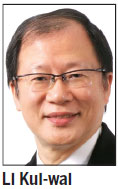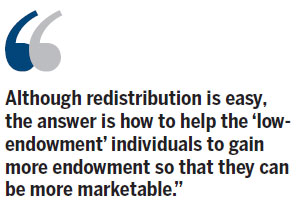Rising welfare expenditure may lead to stagflation
Updated: 2014-02-17 07:13
By Li Kui-wai(HK Edition)
|
|||||||||
Because individuals differ from each other in their resource endowments, equality in benefits and gains are not possible. Modern economics talks about equality of opportunity, as that is the only guarantee that individuals are rewarded according to their endowments. Economic outcomes are relative and dynamic, as economic comparisons become intra-personal; namely how an individual is compared today with 10 years later, for example.
Welfare advocates only look into the income inequality aspects of economics and concern the spending side of the budget equation. Indeed, it would be great if welfare advocates start to consider the income or revenue side of the budget equation. Welfare is popular in all societies because there are always more "low-endowment" individuals who would like to receive welfare than "high-endowment" individuals who can look after their economic needs. Treating income inequality is different from resolving poverty. No society can have income equality, because society trains people to be unequal. We train lawyers, doctors, professors, but at the same time, there are restaurant dishwashers and street cleaners. One should not discriminate between jobs, but jobs do receive different rewards, and this forms the basis of income inequality. Although redistribution is easy, the answer is how to help the "low-endowment" individuals to gain more endowment so that they can be more marketable. In short, resolving poverty is more appropriate than redistribution through welfare.

Welfare advocates tend to look at poverty as a stock and count how many poor Hong Kong has today, and once the quantity is known, it is time to spend public resources. On the contrary, poverty should be looked at as a flow. Poverty is dynamic issue, as there are always new "poor" due to unemployment, school leavers and individuals facing survival problems. The flow concept of poverty reduction is to make policies that can avoid or reduce the number of new poor entering the poverty pool on the one hand, and on the other hand make policies that can encourage the poor to depart from the poverty pool. In short, it is an "in and out" concept, which requires more sophisticated social policies than simply redistribution.
Hong Kong is enjoying fiscal surpluses regularly for various reasons. One is that Hong Kong is a small and open economy, meaning private businesses and activities are not conducted by the government, but the government has tax revenues and other income. Hong Kong does not need to spend on military commitments. Hong Kong governments tend to pursue a "conservative" attitude in estimating the budget, meaning that estimates on expenditure tend to be on the high side, while estimates on revenues tend to be on the low side. Most important of all is that many budgetary items are used for long-term investment that turned out to be "capacity building" for future economic development. Typical budget items are education, infrastructure development and building business incentives. On the contrary, the fiscal structure aids individuals with their economic difficulty, such as public housing and welfare expenditure in the annual budget.
The current fiscal system in the Hong Kong SAR walks on "two legs" of permitting the build-up of future economic capacity and taking care of the needy. A fiscal surplus is a measure of the economic health of the society. Indeed, the economics of any fiscal policy is that government expenditure should be counter-cyclical, spending more in times of economic difficulties, because the purpose of government expenditure is to avoid further recession. On the contrary, in economically healthy periods, government should follow a contractionary policy. This is to avoid economic overheating and unnecessary inflation that lowers everyone's purchasing power. Between 1994 and 1997, for example, the government continued to commit huge expenditure even at a time of economic booms, resulting in high inflation, economic overheating, eventually a financial crisis burst in 1998, to be followed by years of economic recession.

The current economic situation in Hong Kong is good, but not that rosy. GDP is not expected to increase rapidly, though unemployment remains low at around 3 percent. Given that the economy is steady and not crisis-prone, it is time to work on long-term development, and figure out policies that will enlarge Hong Kong's economic capacity and capability. Poverty will be resolved once more jobs are available as the poor can depart from the poverty pool, and as more high-paid jobs are forthcoming, there is upward mobility that in turn creates more jobs for the low-skill individuals. This is the proper economic way to deal with poverty.
On the contrary, at a time of rather low economic growth and rising economic uncertainty, a massive policy on welfare will surely kill the surplus overtime. Currently, dishing out welfare items is becoming more personality-driven, rather than system-driven. Indeed, it is intervening into the life of the welfare recipients, although they are receiving more. It is true in all market economies rising welfare payment is incentive-reducing, because if aid is given to low-endowment individuals, the high-endowment individuals can be discouraged. It may even lead to downward social mobility, as more is encouraged to receive welfare than to work on their way out. With welfare expenditure rising faster than GDP growth, Hong Kong will end up with stagflation, a situation of inflation combined with low growth.
The author is associate professor of the Department of Economics and Finance at City University of Hong Kong.
(HK Edition 02/17/2014 page9)